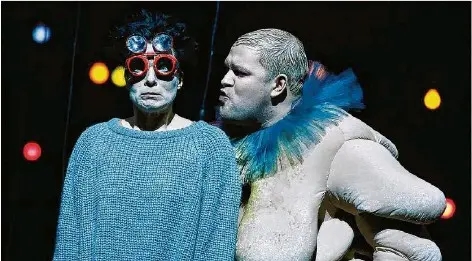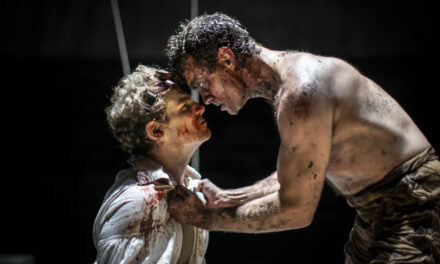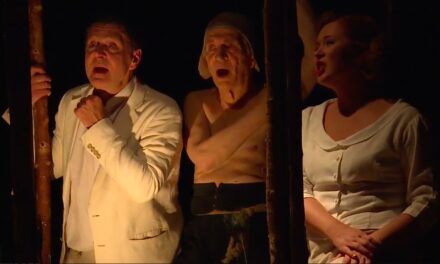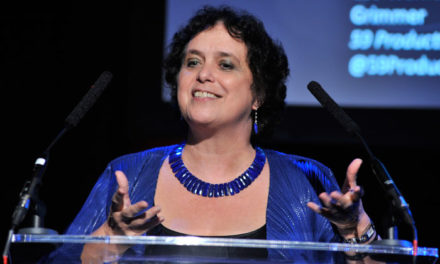Dmitry Troyanovsky is a theatre and opera director living in Boston, MA. Born in Kyiv, Ukraine (then USSR), Dmitry moved to NYC in his teenage years as a refugee. His works could be seen in major theatre institutions and academies across the US, and internationally such as in Shanghai and Moscow. Dmitry teaches in the Department of Theater Arts at Brandeis University.
In the Summer 2022, Dmitry traveled to Berlin to attend the Berliner Theatertreffen and volunteer with Ukrainian refugees. He shares his experiences and observations of German theatre’s response to the political changes in these “impressionist notes.” Here, Dmitry reflects on theatre, his connection to Ukraine, and his first-hand experience with Ukrainian refugees.
June 2022
Berlin, Germany
Excerpts From a Sort of Berlin Diary
Spring in Berlin means the ubiquitous fragrance of linden trees. An aroma that transports me back to late May evenings of my Kyiv childhood. I could be in Shevchenko Park with my mother. The sun is setting, but no one wants to go home. Our mothers are chatting with each other. They’re not rushing us kids. We’re at play, acting out an elaborate scenario. Probably cops and robbers. The sandy playground (which will be destroyed by a Russian rocket forty years later) reeks of urine and cigarette butts left by drunken revelers who take over after dark. I get bossy in these kids’ games, telling everyone what to do. For some reason, the other children listen. The future theater director taking his first steps.
It’s 2022 and I’m not in Kyiv. Though, these days, half of Kyiv seems to be in Berlin. Normally a high-energy city, Berlin is more sedate than usual. Like the rest of the world, Berliners are reeling from the long pandemic and the war in Ukraine. Here especially, it’s impossible to escape the reality of the terrible conflict. Ukraine is geographically close. Since February, hundreds of thousands of refugees have been reaching Berlin by trains and buses. Ukrainian and Russian can be heard everywhere. Many local families are hosting refugees in their homes.
My agenda for the trip: attend a symposium on directing practices and pedagogies, see as much theater as possible, and aid Ukrainian refugees. Immediately, I’m struck by the contrast between the way German and American theater communities are reacting to the war. The American theater community treats it as a tragic but distant problem. I’m yet to see a major performing arts institution programming projects and events to address the war. Has American theater turned irretrievably inward? Is the topic too depressing in an era when audience attendance is still below pre-pandemic levels?
The German theater community acknowledges that the war has changed everything. The theater artists in Berlin engage. Solidarity is everywhere. The lobby of the Schaubühne features transcribed testimonies of newly arrived war victims. The Schaubühne is also working on a devised performance with refugee actors and dramatists. Across town, the Volksbühne is hosting a salon for refugees – a welcoming place where Ukrainians can hang out, grab a coffee, listen to live music. Admission to cultural events is free for refugees. Every theater is fundraising for Ukraine. Theatertreffen, one of the most important theater festivals in the German-speaking world, is featuring public conversations with theater makers from Ukraine.
*** ***

Berliner Ensemble. Draußen vor der Tür (The Man Outside). PC: Matthias Horn.
This year’s Theatertreffen is a quiet affair. It pales in comparison with the dramaturgy of life unfolding on Germany’s doorstep. One of the timeliest productions is Berliner Ensemble’s Draußen vor der Tür (known in English as The Man Outside), directed by the visually inventive Michael Thalheimer. The Expressionistic play, written by Wolfgang Borchert in 1946, tells the story of Beckmann, a traumatized soldier who returns home from Russia only to be rejected by the post-war society. The play’s reception history is complicated. Immediately after the war, nobody was in the mood to confront the past. For years, the play remained unloved. When Berliner Ensemble slated the production for its 2021-22 season, the choice raised eyebrows. Why this text? Why now? By the time the production opened in the spring of 2022, reality made the play relevant. Thalheimer stages it like a fever dream. The cavernous space contains no scenic elements except hundreds of multi-colored lightbulbs. The designer Rainer Casper performs miracles with these bulbs. Stunning lighting transforms the space into a starlit field by the river Elbe, a decrepit apartment building, an eerie cabaret, and a hellscape. Thalheimer populates the stage with the living dead. Ice-cold stares, contorted bodies, and disembodied voices recall ogres, witches, and goblins out of fairy tales and horror films. This is what happens to a society responsible for crimes against humanity suggests Thalheimer. The production exhorts us to consider the price a nation pays for perpetrating atrocity. Can society ever get past its collective delusions and crimes? Can it survive? During the curtain call, an actor who plays Death urges us to donate to the Ukrainian cause. The line between theater and reality blurs.
*** ***
Most of the drama in Berlin is off-stage. Thousands of new refugees arrive every day. Volunteers who speak Ukrainian or Russian are needed around the clock. I have the language skills and my own experience as a refugee. When I was 13, my family and I spent months as stateless asylum seekers in Western Europe while the United States vetted us. I sign up to work in the Welcome Hall, a giant tent outside Hauptbahnhof, the central train station in the heart of the city. It’s one of the transportation hubs for refugees. From here, they’ll travel to other German cities or continue their journey to other European countries where family members or friends are waiting for them. Some days more than 6000 people come through the tent. It can feel overwhelming. Many tragedies, traumas, and problems, which volunteers won’t solve in this improvised welcome tent. Some refugees want to return home as soon as it becomes safe. Others, like the people from the destroyed city of Mariupol, have no home left.
*** ***
Berliner Stadtmission runs the Welcome Hall. The volunteers wear blue colored vests and, thus, nicknamed die Blaue Westen (the Blue Vests). Interpreters like me are identified by our greenish vests. By May, Berlin can’t absorb new arrivals. Our job is to welcome them, make them feel safe, offer rest, food, hygiene, and medicine before shuttling them to Tegel, a former airport transformed into a shelter and registration center. My Berlin friends describe chaotic scenes at Hauptbahnhof at the end of February and early March. The city was unprepared for the influx of refugees. There was no infrastructure. The refugees had no idea where to go. Dozens of well-meaning volunteers haphazardly flooded the station. It took a while for the government and philanthropic organizations to mobilize. Now, I see no vestiges of disorganization. The tent hums with typical German efficiency.
*** ***
Interpreters come in two types. A small group of older people who grew up in East Germany and retained some Russian, which they were forced to learn in school. The bigger group is made up of native Ukrainian and Russian speakers who immigrated to Germany in the 1990s and early 2000s. From what I can tell, I’m the only non-German resident among the volunteers on my shifts. Whenever there’s a lull in activity, typically before ten in the morning, we get to know each other. When I relate that I’m from the United States, they appear surprised and even amused. One volunteer quips: “You’re visiting Berlin and you can’t find anything more fun to do than this?”
*** ***
People in peaceful, prosperous Western countries have a cinematic image of refugees. Bedraggled, poorly dressed, grimy, shouting masses out of central casting. In truth, refugees can look like someone you meet on the Upper West Side or in the tawnier enclaves of Marine County. Refugees are a diverse bunch. All kinds of people flee when wars, genocides, revolutions, and upheavals come knocking on the door. Rich and poor, urban and rural, sophisticated and provincial, privileged and marginalized, healthy and ailing. Ironic hipsters and rustic babushkas. Refugees equipped with iPads and those whose sole possession consists of an overstuffed shopping bag. You become a refugee in one inauspicious moment when a siren wails at dawn and scared-looking people run for shelter or when it’s not safe for someone who looks like you or worships like you or thinks like you to stay put. I became a Soviet Jewish refugee when I was a teenager. You never know.
*** ***
A mother with a small boy from the Eastern part of Ukraine arrive. The boy, surprised to hear my Russian greeting, tells me “Hello, I’m from Ukraine.” “So am I,” I reply. He smiles.
*** ***
A man in a wheelchair is here every day. He buttonholes volunteers and draws them into protracted conversations. It’s not clear what he wants or if he wants anything at all. He tells anyone willing to listen: “I was injured in the first days of the invasion. I laid for a month in a German hospital. I just got out.” Why does he keep coming to Hauptbahnhof? The Welcome Hall is for new arrivals. He has a place to stay in Berlin. His basic needs have been met. Is he lonely? Is he in love with someone here? I notice that the more experienced volunteers avoid him. If you engage, he’ll demand a lot of your time, preventing you from dealing with more urgent cases. The state of emergency requires pragmatism.
*** ***
The refugees who just escaped from Ukraine look disoriented and harried. They have no idea what to expect. Those who spent weeks or months in places like Poland, Lithuania, or Moldavia before coming to Germany appear less tense. They are “seasoned” refugees. They’ve had time to start processing their plight. They tend to ask very specific and practical questions: where to get a new SIM card, how to enroll their kids in school or take free German lessons. Like it or not, they know they’re in for the long haul.
*** ***
Many won’t be staying in Berlin for more than 24 hours before going to other parts of Germany. At this point, Berlin cannot absorb more refugees. Housing is scarce. Some try to use their brief time in Berlin to sightsee. Before the war, many people never traveled abroad. “We have two hours before the train to Düsseldorf. Is there anything interesting within walking distance of the station?” asks one family, “Is the Reichstag nearby?” It’s the direst, most heartbreaking form of tourism imaginable.
*** ***
“Do you know how to get to the Ukrainian embassy?” asks one couple. I’m not a local, but as it happens, I know exactly how to find it. It sits on a quiet block next to the Deutsches Theater. I took note the other night when attending a so-so performance of Schiller’s Maria Stuart. As always, the theatre is my signpost, my physical and emotional mapping. My Berlin looks like a theater treasure hunt.
*** ***
Two unaccompanied teenagers, a boy and a girl, enter the tent. My guess is that both are around 16. The boy is trying to act manly and protective of the girl. He’s doing all the heavy lifting, carrying two large suitcases and a bag. I ask them if they need any help. The boy brusquely declines. A familiar pose of Eastern European machismo, hiding vulnerability. Are they siblings? Lovers? Runaways? I need to alert the child protection services. It’s one of the things we’re instructed to do if we catch sight of unaccompanied minors. The Blue Vests say that in the early days of the war lots of children arrived alone. Parents, who couldn’t leave Ukraine, put their children on trains and told them to get as far away from Ukraine as possible. As part of the family lore, my grandmother would describe similar scenes unfolding during the frenzied evacuation as the Nazis were approaching Kyiv. Before I have a chance to report the teens, I see the workers from the agency approaching. For the next hour or so they will be talking with the teenage couple. I will never know their story. Someone needs me at the Red Cross station.
*** ***
My green vest and the badge with my name make me look very official. Sometimes refugees don’t realize that I’m only an interpreter. I don’t decide anything. An older woman pleads with me: “May I volunteer? I’ve been in Berlin for almost a month. I’m from Odessa myself. My son and his family are stuck near Bucha. Thank god they’re unharmed. I feel so helpless. I need to do something. I stay in my hostel all day. All I do is follow the news on my phone and sob. I’m losing my mind. I can be useful. I can serve food. I can take care of children. I can clean. Please let me do something.”
*** ***
The most devastating encounter happens on my last shift in the tent, the day before I leave Berlin. A middle-aged woman and her son arrive from Tallinn. They are transiting to Halle, a smaller city in central Germany. I’m assigned to assist them. Bit by bit, I learn their story. They come from Mariupol, where they hid in a cellar for two months, trying to survive Russian bombardment. After Mariupol fell, the invaders illegally deported them to a city in the South of Russia. Anti-war Russians helped them to escape to Estonia. The journey from Russia to Berlin took three weeks.
There’s a combination of urgency and exhaustion in the woman’s demeanor. She is a Russian speaker. “My son has cancer. Before the war, he was receiving chemotherapy. The war put an end to it. He missed several months of treatments. Doctors in Estonia told me that it might be too late to save him. Our best hope is Germany. They say cancer treatment here is excellent. Someone arranged a hospital bed for my boy,” explains the woman, “You see, that’s where we’re going today. A hospital in Halle. Can you help us get tickets for the earliest train? But first he needs a pain killer.”
The young man is visibly struggling. Luckily, there is a Red Cross station in the tent. Before giving him the shot, the doctor asks to see the man’s passport. I’m asked to translate his name for the medical log. It’s part of the procedure. The passport photo shows a handsome young man in his early 20s. Unrecognizable now.
Suddenly, this is harder than any other task I’ve had to perform at Hauptbahnhof. Not only is the story of the mother and son truly terrible, it also evokes the worst time of my own life. The last months with my mother, who battled terminal cancer and died at the beginning of the pandemic, her treatments interrupted by the COVID emergency. The brave mother from Mariupol is a kindred spirit – loss, hope, panic and determination in equal measure. I feel like crying but fight back my tears. My feelings are irrelevant. I have a job to do. I can’t be of use if I become emotional. My sentiment won’t change a thing. It may even insult these stoic people, making a heroic trek despite the odds. After we book tickets for Halle, I bring them to the platform. The son is too weak to carry anything, so I offer to haul a couple of bags. The moment before we part feels Chekhovian. We wait in silence. “German trains look so beautiful,” says the woman.
Later that day, I allow myself to grieve. For my mother. For the mother and son from Mariupol. And the countless Ukrainian lives and dreams shattered by the war.
***
To read previous reviews and interviews about Dmitry Troyanovsky, see:
Foreignness and Familiarity: An Interview with Dmitry Troyanovsky
Love, Death And Soviet Spies: Boston Playwrights’ Theatre Stages Its First Opera, “The Rosenbergs”
“The Ugly One”: Examining the Instability of Identity with Brevity and Wit
This post was written by the author in their personal capacity.The opinions expressed in this article are the author’s own and do not reflect the view of The Theatre Times, their staff or collaborators.
This post was written by Dmitry Troyanovsky.
The views expressed here belong to the author and do not necessarily reflect our views and opinions.


















